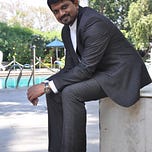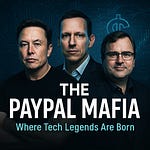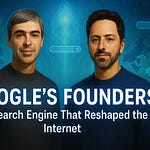HOST (Harish):
Welcome to another episode of Tech Stories—the podcast where we go behind the scenes of world-changing innovations.
I’m your host, Harish H N. And today, we explore one of the most remarkable journeys in tech history—the story of how two college students, Larry Page and Sergey Brin, transformed a class project into the engine of the modern internet.
Google. A company that became a verb.
"Just Google it"—we say it every day. But where did that come from?
Behind this global phenomenon is a lesser-known tale of relentless pursuit, painful rejections, sleepless nights, and a burning belief in solving a problem no one else thought was important.
They didn’t start in a palace of code or a billion-dollar lab.
They started… in a garage. With second-hand computers and servers that caught fire. Literally.
In this episode, I take you deep into the real story of how Google was born—not the polished version, but the raw, intense, emotional truth.
And by the end, I believe you’ll not only admire Google more—but find a piece of your own story in theirs.
PART 1: TWO BRAINS, ONE VISION
Let’s rewind to the summer of 1995. Stanford University.
A young student named Larry Page had just arrived on campus. Tall, thin, and soft-spoken, he was the son of computer scientists. To him, computers were not just machines—they were logical extensions of the mind.
He was curious. Not just about programming, but about how things worked at scale. Even as a kid, Larry would dismantle home appliances just to see how they fit together.
And then there was Sergey Brin.
Born in Moscow and raised in the United States, Sergey was intellectually fearless. He was passionate about mathematics, loved solving puzzles, and had a rebellious streak that made him both charismatic and unpredictable.
When they first met, they clashed. Literally.
Sergey found Larry “arrogant.” Larry thought Sergey was “too argumentative.”
But that friction… turned into fire.
During a walk around Stanford, the two began discussing ideas for solving the mess that was the early internet. Remember—this was the 90s. The web was wild. Yahoo, AltaVista, Lycos—every search engine of the time was chaotic. You typed in a keyword and got... well, junk. Irrelevant, unranked pages.
Larry believed the internet needed structure.
He wanted to organize the world’s information. Sergey agreed. They decided to tackle it as a research project.
And that’s where the story really begins.
PART 2: THE ORIGIN OF PAGERANK
In 1996, Larry started exploring an idea: what if you could rank web pages not by how often a word appeared, but by how many other sites linked to it?
Think of it like academic citations: if lots of reputable sources reference a paper, it must be important. Larry called this system BackRub—and later, PageRank.
Sergey helped develop the math. Together, they built a crawler that began indexing Stanford’s network. The results were stunning. Their algorithm didn’t just return more results—it returned better results.
Their professors were amazed. One even told them:
"You guys don’t just have a good research paper. You may have a company."
But neither Larry nor Sergey knew the first thing about building a business. They were academics, after all. Still, they believed in the product—and wanted it to reach the world.
They renamed the project: Google, a play on the word “googol”—1 followed by 100 zeros. Because their dream wasn’t small.
It was to index everything.
But dreams, as you know, don’t come easy.
PART 3: REJECTED BY YAHOO
So here’s where the real emotional rollercoaster begins.
In 1998, Larry and Sergey had a working prototype. Google was fast. Clean. Accurate. Everything the current search engines were not.
They pitched it to Yahoo, the reigning king of web directories.
Larry and Sergey weren’t even asking to sell Google. They just wanted Yahoo to license it, or maybe partner.
And Yahoo’s response?
“Search isn’t a priority. People search, then leave. We want users to stay. Click ads. Read news. Browse.”
Ouch.
Larry and Sergey were stunned. Their tool was objectively better. But no one wanted better. They wanted stickiness, portals, ad eyeballs.
Over the next few months, they pitched to more VCs and internet companies. Some turned them down politely. Others didn’t bother replying.
Their dream was slipping.
Sergey once told a friend, “I think we built something amazing, but no one wants it.”
But instead of quitting… they pivoted.
They decided to build the company themselves.
PART 4: THE GARAGE YEARS
In late 1998, Larry and Sergey borrowed $100,000 from Andy Bechtolsheim, a legendary Sun Microsystems co-founder. He didn’t even wait for a full pitch—he saw the prototype and wrote a check on the spot.
But they had no office. No company structure. No team.
So they moved into a friend’s garage—Susan Wojcicki’s, who would later become the CEO of YouTube.
Their “office” had a ping pong table, a cheap coffeemaker, and a bunch of second-hand computers. They slept in sleeping bags. Ate takeout. Worked 20-hour days.
They optimized server speeds. Cleaned up UI. Tweaked algorithms. Manually indexed pages. And slowly… word began to spread.
Techies started saying, “Have you tried that new search engine? It’s called Google. It just works.”
Larry and Sergey weren’t just building software.
They were laying the foundation of modern digital life.
But then came… the fire.
PART 5: THE BURNING SERVER INCIDENT
It was the spring of 1999.
Google’s usage was exploding. They were hosting more searches than their tiny infrastructure could handle.
One night, Larry woke up to a text:
“Server room is smoking.”
He rushed to the garage. Smoke had filled the air. One of their homemade server racks—built from plastic bricks and stacked boards—had overheated and caught fire.
They hadn’t invested in proper cooling. They couldn’t afford it.
The fire department came. Neighbors panicked. They thought the garage was a meth lab.
Once the dust settled, the damage was clear. Equipment was fried. Uptime was down. Their dream had almost gone up in literal smoke.
Most people would call it a sign to stop.
Larry and Sergey? They stayed up that night—rebuilding. Calling friends. Borrowing parts. Writing patches. By morning, Google was back online.
They didn’t whine. They executed. Because the mission was bigger than any obstacle.
✅ Would you like me to continue with Section 2 of this Episode
It will cover:
Google's first hires
Their breakthrough growth
Clash with traditional advertising
The shift from search tool to internet platform
Comment Below and Hear to my Next Section of the same Episode










